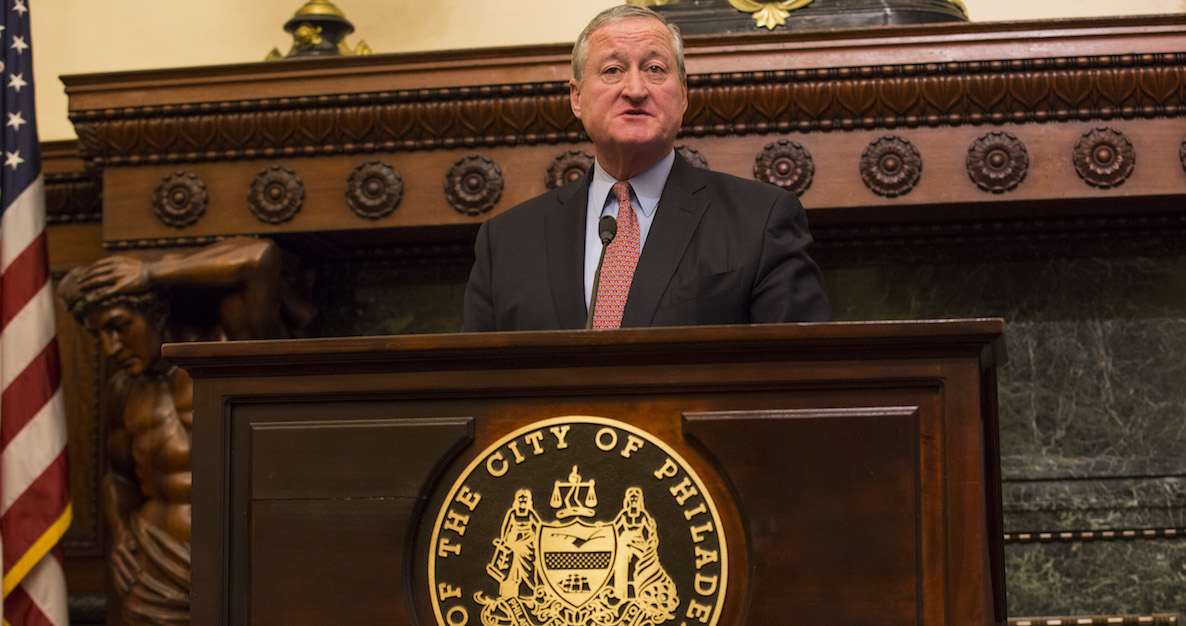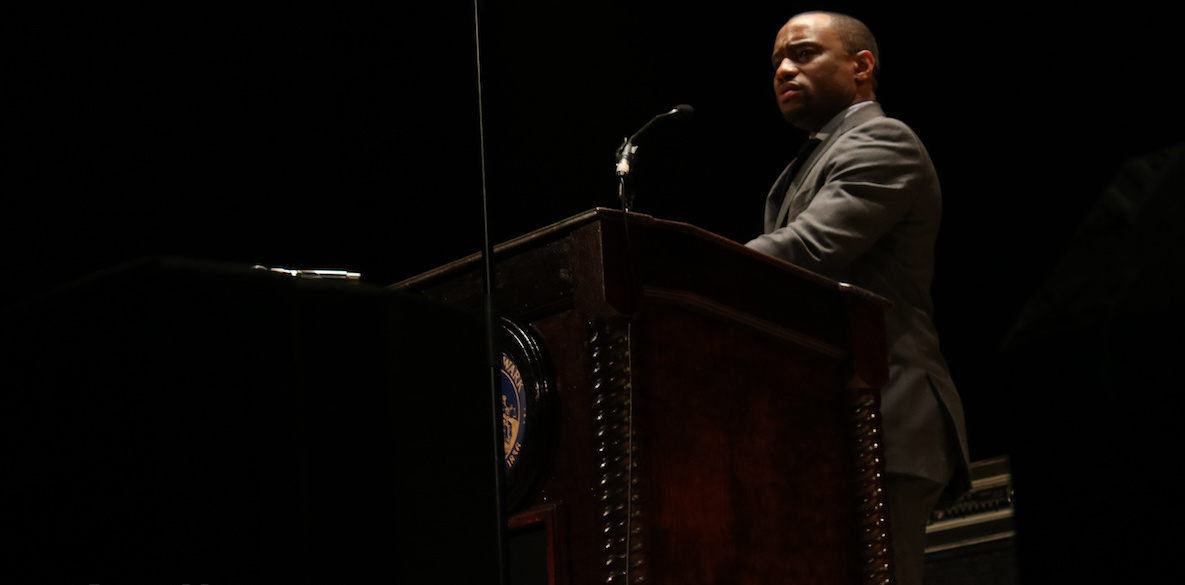At our Ideas We Should Steal Festival last week, bestselling author Rev. Michael Eric Dyson told the story of a recent speech he gave in East Texas—not exactly Dyson country. Two young white male students, offended by Dyson’s point of view, stormed out. “That’s white privilege,” Dyson asserted, noting that, if you’re black or Latino or gay or Jewish or otherwise a member of any of a number of minority groups, you’ve long had no choice but to stay in rooms where repugnant ideas are expressed. Democracy, he seemed to assert, is all about staying and making your case; it’s about answering unpopular speech with speech of your own.
When good-hearted people hear hate, they tend to opt for love. To suppress speech is to give it power.
It’s not, or it should not be, about banishing speakers or silencing offensive speech, except in very particular circumstances, like shouting fire in a crowded theater. Yet it seems like, in these angry and divided times, censoring speech is too often the option of first choice, rather than wading into the messy waters of hashing out a more perfect union.

Prefer the audio version of this story? Listen to this article on CitizenCast below:
Audio Player
Just after Dyson’s comments, we learned that Temple professor Marc Lamont Hill had been unceremoniously fired by CNN, where he was an on-camera pundit, for a speech he made last week at the United Nations concerning Israel and the occupied territories. In this post-Tree of Life moment, Hill’s comments created a firestorm. Even though he has tenure, Temple Board Chair Pat O’Connor intimated that the university would discipline him, as well: “Free speech is one thing. Hate speech is entirely different.” Developer and Temple alum Bart Blatstein penned an op-ed in the Inquirer, arguing that Hill’s comments “showed himself to be an Israel-hating anti-Semite by maliciously and ignorantly calling for Israel’s destruction and genocidal violence and destruction of the Jewish state.”
So what did Hill say that got everyone so riled up? Rather than trust the reporting, I watched the 21 minute speech. His critics lambaste Hill’s call for solidarity with the Palestinian cause as an endorsement of violence or terrorism. But here’s how he frames the issue: “If we are standing in solidarity with the Palestinian people, we must recognize the right of an occupied people to defend itself.” It is correct that Hill doesn’t endorse King and Gandhi-inspired nonviolence, but, in positing his advocacy as self-defense, his argument differs hardly at all from the justifications used by Menachem Begin and other Zionists when they bombed the King David hotel in 1946.
That said, most of the uproar has to do with Hill’s use of the phrase “a free Palestine, from the river to the sea.” That’s a phrase used by anti-Semites to dog whistle for the wholesale elimination of the state of Israel. Is that what Hill was doing?
If everyone is an anti-Semite, then no one is an anti-Semite. Debate Marc Lamont Hill, rather than seek to suppress his challenge to your thinking.
The evidence seems pretty clear that he was not. Earlier in the speech, Hill explicitly states his position in favor of a one-state solution for Israel and the occupied territories. I think this is wrongheaded. But being wrong does not make Hill an anti-Semite.
First, some context: I know and like Marc Lamont Hill. I hired him as a columnist at The Daily News in 2011, where he wrote movingly about driving while black in Philly. And I am Jewish, in the most secular of ways.
But, mostly, I’m an empiricist, and a communitarian. And we seem to be a dying breed. As such, the Hill imbroglio summons a host of concerns, not the least of which is alarm over the depth to which our public debate has sunk. There’s a whole lot of shouting down going on in our cultural and political discourse, a reminder of the aptly titled book by the late Nat Hentoff that chronicled assaults on free speech rights, Free Speech For Me, But Not For Thee.
Nationally, there have been egregious cases like last year’s student assault on a professor at Middlebury College during their successful effort to keep the controversial social scientist Charles Murray from speaking on campus, as well as the ugliness at Evergreen State College, when an angry mob of students turned on a white progressive professor who objected when student activists were asking white people to leave campus for a day as an act of alliance with people of color. When Professor Bret Weinstein objected, writing that “people shouldn’t be allowed to speak or not on the basis of their skin color,” all hell broke loose.
Decide for yourself Do Something
Locally, we have not been immune from the instinct to banish rather than debate. Penn law professor Amy Wax has twice been met with calls for her firing, once when she questioned Christine Blasey Ford’s accusations against Brett Kavanaugh and once when, in a radio interview, she said she couldn’t recall a black student finishing in the top quarter of his or her class at Penn Law. At Drexel, Professor George Ciccariello-Maher resigned after a year’s worth of death threats following tweets like the one in which he was “trying not to vomit” watching an airplane passenger giving up a first class seat for a uniformed soldier.
Instead of death threats or calls for firing, how about just answering the substance of such stupid speech? Instead, aided by the weaponizing of social media, what happens is that critics jump right to impugning the motives of speakers—Hill’s not just wrong, he’s genocidal!—rather than doing the harder thing: answering objectionable speech with smarter speech.
Watch Hill’s U.N. comments for yourself: He does not call for the killing of Jews, or for wiping out Israel. Instead, he calls for embracing the Boycotts, Divestment, and Sanctions movement to hold Israel accountable for its treatment of Palestinians: “This movement—which emerges out of the overwhelming majority of Palestinian civil society—offers a nonviolent means by which to demand a return to pre-[19]67 borders, full rights for Palestinian citizens, and the right to return by international law,” he says.
The easy thing is to focus outrage on the “river to the sea” line, even if, elsewhere in the speech, Hill contradicts that line’s most nefarious implications. It would be one thing if Hill were explicitly calling for the end of Israel; at least then his critics could argue that he was, in effect, shouting fire in a crowded theater.
Aided by the weaponizing of social media, critics jump right to impugning the motives of speakers—Hill’s not just wrong, he’s genocidal!— rather than doing the harder thing: Answering objectionable speech with smarter speech.
But we’ve been down this road before. In 1977, the ACLU defended the right of the Nazi Party of America to march in Skokie, Illinois, a predominantly Jewish town with a high proportion of survivors of the Holocaust. The Illinois Supreme Court, the United States Court of Appeals, and the United States Supreme Court all agreed with the ACLU that hate speech is protected speech, and they let the march go on, in a case that symbolizes our commitment to free speech worldwide.
Would that the mobs of today who seek to stifle offensive or unpopular thought knew what liberals knew back then: That more speech is part and parcel of a vibrant democracy, and that expressions of bigotry naturally give rise to their own refutation. When good-hearted people hear hate, in other words, they tend to opt for love. To suppress speech is to give it power.
Rather than disappear Hill from the public conversation, how about answering him? Here’s how I would do it: I’d first acknowledge that, yes, conditions in the occupied territories are shameful, and concede that Hill does a masterful job in laying out the attendant human rights abuses. According to the U.N., if Israel’s blockade of the Gaza Strip (which is currently run by the terrorist group Hamas) continues, it could become unfit for human life by 2020. It is a human rights tragedy.
But Hill’s solution, driven by an admirable commitment to justice, is actually ahistorical. The fact is that three successive Israeli governments prior to this one did aggressively seek to make peace with the Palestinians, only to be rebuffed, time and again. During Prime Minister Ehud Barak’s term, a two-state, land for peace solution was offered, brokered by then-President Bill Clinton; at the eleventh hour, then-PLO Chairman Yasser Arafat was revealed to prefer political martyrdom over peaceful coexistence.
Articles by Larry PlattRead More
Also under Barak, Israel unilaterally withdrew from Southern Lebanon, which resulted in the entrenchment of the Hezbollah, committed to Israel’s destruction. Even hawkish Prime Minister Ariel Sharon defied his own party and withdrew from Gaza entirely—creating a void to be ultimately filled by terror group Hamas. Finally, under Prime Minister Olmert, Israel profferred a deal on Jerusalem and the West Bank, which didn’t even engender a counter offer from the Palestinians.
We ought to share Hill’s concern over conditions in the occupied territories, and we ought to join him in critiquing the Netanyahu government. But it is folly to suggest that all that is needed is a different set of actions on the part of Israel to achieve peace.
Israel, keep in mind, is the size of Rhode Island, surrounded by entities who refuse to recognize its right to exist. And yet, time and again, it has sought to make peace, only to, Charlie Brown-like, have the football pulled back at the last moment. That doesn’t excuse modern day human rights abuses, but it does help to debunk Hill’s proposed solution. Throwing Palestinians and Israelis into one sink or swim state together—especially when Hamas will not even recognize Israel’s right to exist—is nothing more than an invitation to civil war.
But give Hill this: It’s an idea, and it should be debated, rather than met with attempts to silence him. In the aftermath of the Tree of Life massacre, not to mention a 37 percent increase in anti-Semitic acts last year, a highly sensitive response to any one who mouths the platitudes of Hamas is understandable. But it only keeps the opposing sides talking past one another. And it further demeans real cases of anti-Semitism. If everyone is an anti-Semite, then no one is an anti-Semite. Debate Marc Lamont Hill, rather than seek to suppress his challenge to your thinking.






